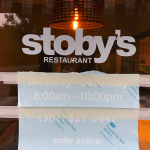Almighty God, to you all hearts are open, all desires known, and from you no secrets are hid: Cleanse the thoughts of our hearts by the inspiration of your Holy Spirit, that we may perfectly love you, and worthily magnify your holy Name; through Christ our Lord. Amen.
-Collect for Purity
This past Sunday, Kevin and I were confirmed as members of The Episcopal Church (TEC).

Kev and I with our Deacons, Peggy and Linda
(read below for more about Deacons in the Episcopal church) These ladies are a huge portion of why the church means so much to us, and why we feel so at home.
This has been a happy, easy journey for us, starting last May. For some details on that, check out this post:
Now that we’ve been attending for about 16 months, and gotten deeply involved, I have some thoughts I’d love to share on what we love about The Episcopal Church. Prior to visiting, we knew essentially nothing about the church. The more we’ve gotten to know, the more we’ve fallen in love. Here are some of our favorite things about TEC, that may also serve as an FAQ/Did You Know for those interested:
- Does the Episcopal Church teach scripture? Does it believe in Jesus?
Resoundingly, YES! When we first met with clergy from our church, these were some of the first questions I asked. Since I knew the church was a bit more liberal than I was accustomed to, I was concerned about relativism or a compromising stance on the truth. I’ve found the exact opposite.
The Episcopal Church (and the greater Anglican communion) operates off of a calendar called the Lectionary. Basically, it’s a calendar of suggested readings throughout the year, following the seasons of the church year. Each week, there are 4 readings in our services: one Old Testament, one from Psalms or Proverbs, one New Testament, and one Epistle (a reading from one of the 4 Gospels). The sermon then comes from one of these readings (usually the gospel reading).
A beauty that I found in this is that it is not pastorally or topically driven at all. Meaning that a person can’t decide “this is what people need to hear, in the Name of God” and then go preach it. Clergy is responsible for studying and praying over the week’s readings and speaking from one of these.
Additionally, there is so much power in scripture being read aloud. That’s right — each of these readings is read aloud in service.
My concern of “not enough of the Bible” was quickly turned upside down with “you’ll read more scripture than you have in your entire life.” - Are Episcopalians Christians?
Yes. - What do Episcopalians believe?
In short, Episcopalian beliefs are not too different from Protestant Christianity (and likely don’t differ from your beliefs at all). Our beliefs are summed up in the catechism of the Episcopal church. You can find that here. - Why is everything so formal?
In short, it’s just tradition. BUT, there is a reason for everything. Literally, we haven’t yet found a single thing that there isn’t a long, thought-out reason for. - Why do you love it?
(this one will take me a while!)
- One of the core beliefs of the Episcopal Church, affirmed in the Baptismal Covenant, is to respect the dignity of every human being:
Celebrant: Will you strive for justice and peace among all people, and respect the dignity of every human being?
People: I will, with God’s help.
This means a lot to me because, in short, I’ve been around plenty of churches and Christians that don’t respect the dignity of every human being. The idea of “we love you, but don’t want you here” or “we don’t believe God is at work in your life” is really hard for me – and frankly, I think people just get it wrong. Scripture makes it pretty clear that Christ and His love are acceptable to all of us. Even those that are a different color, nationality, gender, whatever — just because someone is different from you doesn’t mean they are magically exempted from access to the love of God, or salvation.
You know, when I write that my first thought is “well, duh,” but I have personally had multiple encounters where someone’s actions told me the exact opposite. That hasn’t been the case with the EC.The very real demonstration for us has been the unquestioned acceptance of the LGBT+ community. The church globally is missing the mark by pushing people away. The unquestioned welcoming of all – without giving it a second thought – is so refreshing. And so Christ-like. - I love the diversity.
Kev and I know we want to raise our (eventual) family in church. We also know that we want our children exposed to diversity, of all types. This doesn’t just mean orientation. I’m actually specifically referring to diversity in age in our congregation. The Sunday School class we attend most Sundays ranges from early 20’s to early 90’s. This is totally different from my previous experience of people all my age in my same stage of life. The beauty in this is that our discussions are rich in opinion and wisdom. At different stages in life, we bring totally different perspectives to the table, and we’re all able to learn from each other. - I love the Eucharist.
The Eucharist (fancy word for Communion) is kind of the core of the service. It happens in almost every service, every week. Originally, I was worried that taking Communion weekly would dilute the value for me and it would start to lose its meaning. The opposite has been true. I look forward to that time and find that Christ speaks to me differently each week during that time. Additionally, the Eucharistic prayers are absolutely gorgeous and put my mind in the right frame to remember Christ’s sacrifice for us. - I love the high standard for clergy.
The process to become a Deacon or Priest in the Episcopal church is years long — and not everyone is a shoe-in. Those interested in being ordained enter a years-long discernment process. Some make it through, some do not. If they do, they then proceed to seminary and complete this before ordination.
Get this — Deacons are volunteers. Non-paid. But still go through this process and through seminary, often on their own dime, to serve for free. Wow. - There’s beauty in liturgy.
Liturgy is the “service script” we follow each week. Lots of it repeats from week to week, including the Nicene Creed, one of the affirmations of our faith. There’s beauty in repetition. Someone once described it to me as “our words become our thoughts. Our thoughts become the mediations of our heart. These meditations become our actions, which then become our lifestyle.” - I love the focus on unity.
Unity in the church, locally and globally. Unity in the world.
Each week, we pray for the unity of the church. We pray for congregations elsewhere in the world. We pray for people who don’t believe like us (yup, God loves them, too).
A beautiful example of this I’ve seen is demonstrated in the Eucharist. Prior to taking Communion, there’s an area of the service called “The Peace.” To an Evangelical defect like myself, it would seem like a meet & greet. What it originally was intended for was for people to find anyone in the room they may have conflict or tension with and share God’s peace with each other and resolve it, before going to the table to take Communion together. How beautiful is that!?
Ready to pass some eye-water?
After serving at the altar, those serving the Eucharist then go out into the congregation and take Communion to those who aren’t able to stand up or come to the alter easily.
If that didn’t get you, this will:
After Communion, there’s a “sending out sacrament.” At this time, the church prays over consecrated Communion elements, and members of the congregation called Eucharistic Visitors take them out, and often leave immediately and go straight to the homes of those who are home-bound or unable to be at church. The idea in this is that we are sharing in Communion together at the same time.
“Who we are many are one body, because we share one bread, one cup.” - Everyone is welcome at the table.
Have you ever been a visitor at a church where you weren’t allowed to take Communion? It’s painfully awkward, and it never sat quite right with me–didn’t seem to me that Jesus would turn someone away. Our Priest says each week before Communion “Wherever you are on your journey of faith, you are welcome at this table.” Another Priest in Arkansas once explained “This isn’t our church’s table. This isn’t the Episcopal church’s table, and it certainly isn’t my table. It is Christ’s table, and you are always welcome at it.”
Welcoming and showing the love of Christ in the simplest of ways… - We’ve found a family.
Actually, we inadvertently found two, ha. We have two small groups that meet in homes every other week. These people have become our rocks and support system. Our lives are made richer because of them, and we are more thankful that I could ever put into words for their love and influence in our lives.
Some of our small group family from St. Peter’s, including our new Priest, The Rev. Greg Warren.
- They accepted us, as we were.
This one is probably the most expected answer. Our church search began when we needed a place to grow in Christ together. Not only were we accepted at St. Peter’s, but we were loved. From the beginning. People were excited we were there, and they still are. And now we’re happy to welcome others with open arms, sharing the same love shown to us. - They push us to be better.
By focusing on Christ’s love and the way He lived His life, we are encouraged to be better. To love better. To be that light in the world.
Walk in love, as Christ loved us and gave himself for us, and offering and sacrifice to God.
If you’re interested in visiting the Episcopal Church, feel free to comment or send me a message. I assure you the church would love to have you. If you are local, you can sit with Kevin and I any time. 🙂

Our confirmation class. Over 20 new members!









 Later the same weekend, we had the “Make Your Mark” event for
Later the same weekend, we had the “Make Your Mark” event for 





































































































